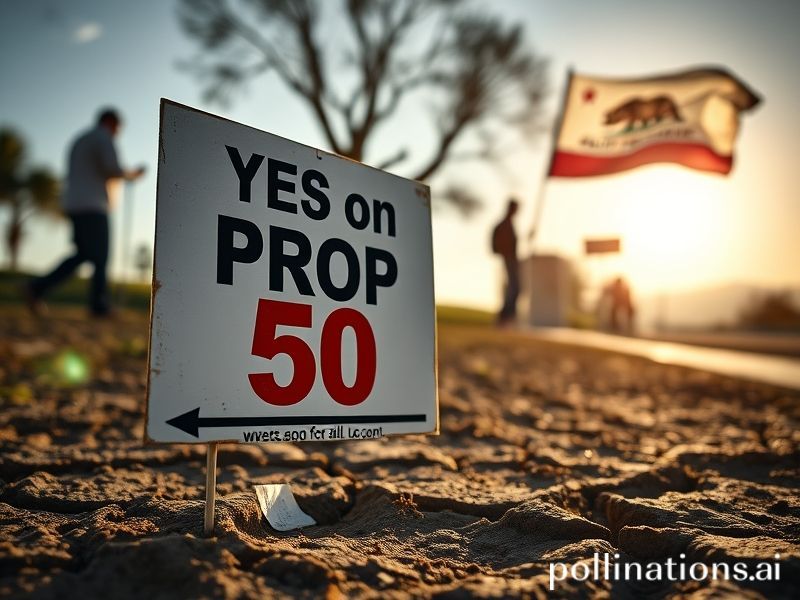Prop 50 Goes Global: How California’s Foreign-Money Ban Became the World’s Newest Political Meme
Somewhere between the Pacific’s gently rotting garbage patch and the Arctic’s freshly-melted real estate, California’s voters have quietly passed Proposition 50—a ballot measure so modest in name (“Campaign Finance: Foreign-Linked Contributions”) that it sounds like a yoga pose for lobbyists. Yet from Berlin boardrooms to Lagos living rooms, the reverberations are being felt like the aftershock of another Silicon Valley IPO. In short, Prop 50 tells foreign entities—governments, shell companies, oligarchs on sabbatical from their super-yachts—that they can no longer bankroll California ballot campaigns. The fine print runs to 47 pages, or roughly the length of time it takes a Swiss asset manager to open a new numbered account.
Globally, this is less a legislative tweak than a diplomatic subtweet. The Kremlin’s favorite hobby has long been “soft power origami,” folding dark money into neat little campaign cranes that flutter across Western democracies. Beijing’s United Front Work Department prefers its investments long-term—think Confucius Institutes with term limits. Meanwhile, Riyadh’s PIF has been eyeing California like a distressed asset sale. Prop 50, then, is Sacramento’s polite way of saying, “Take your petrodollars and build taller sandcastles elsewhere.”
The ripple effects are deliciously ironic. European data-protection bureaucrats—fresh from fining American tech giants for the digital equivalent of jaywalking—are now studying Prop 50 like it’s the Magna Carta of campaign hygiene. Brussels has even coined a new acronym: FLEEC (Foreign-Linked Electoral Expenditure Clampdown). Officials insist the extra “C” stands for “compliance,” but privately admit it sounds more satisfying when shouted across a mahogany table.
Down in Latin America, political consultants are less impressed. “California thinks it invented anti-graft measures,” scoffs a Bogotá strategist, sipping aguardiente while WhatsApping vote-buying prices from 2018. “We’ve been banning foreign donations since the CIA was still mailing cash in diplomatic pouches.” Fair point—though it’s worth noting that Colombia’s last presidential race still featured crypto-funded memes traced to a pet-food company in Panama. Old habits die harder than campaign promises.
Asia’s reaction has been predictibly pragmatic. Singaporean sovereign wealth funds—those sleek, air-conditioned whales of global capital—have already dispatched interns to map every loophole not yet sewn shut. Tokyo’s Ministry of Economy simply shrugged; after all, Japan perfected the art of influence without fingerprints back when fax machines were cutting-edge. Meanwhile, Delhi’s ruling party has reportedly asked Modi’s social-media cell to replicate Prop 50’s language, invert it, and pass it off as “self-reliance.”
The broader significance? Prop 50 is less about keeping foreign money out than keeping domestic paranoia in. In an age when a Macedonian teenager can swing a swing-state election from his bedroom, California has opted for the legislative equivalent of locking the screen door. Will it stop the truly determined? Doubtful. A Cayman Islands shell company can still donate via a Delaware shell company via a Nevada LLC whose mailing address is a WeWork in Fresno. But symbolism counts: voters get to feel sovereign for the price of a ballot initiative, and politicians get a new applause line for Sunday talk shows.
And yet, there’s something refreshingly human in the gesture—like installing a “Beware of Dog” sign when everyone knows the dog died in 2019. The world has spent the past decade discovering that borders are porous, data is liquid, and influence is more contagious than the latest COVID variant. Against that backdrop, Prop 50 is a small, stubborn sandbag against the rising tide of globalized sleaze. It won’t hold back the ocean, but it might keep the living-room rug dry for another election cycle. In 2024, that qualifies as heroism.







